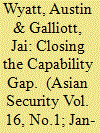|
|
|
Sort Order |
|
|
|
Items / Page
|
|
|
|
|
|
|
| Srl | Item |
| 1 |
ID:
171138


|
|
|
|
|
| Summary/Abstract |
The emergence of Lethal Autonomous Weapon Systems (LAWS) offers a comparatively low adoption-cost strategy to emerging great powers that would allow them to offset the conventional military advantage enjoyed by their rivals, which threatens the established global balance of power. This article critically analyses the role of China and the United States in the development of the “hardware” and “software” components of LAWS, concluding that, while the demonstration point has not yet been reached, the incubation of this emerging revolution in military affairs has already begun to have a geopolitical impact.
|
|
|
|
|
|
|
|
|
|
|
|
|
|
|
|
| 2 |
ID:
170974


|
|
|
|
|
| Summary/Abstract |
The procurement of autonomous weapon systems is on the rise in Southeast Asia, where, as in other parts of the world, interest in the military applications of unmanned systems is outpacing fractured international regulation efforts. This article analyzes the diffusion of drone technology in Southeast Asia and argues that we are at an inflection point, representing an opportunity for The Association of Southeast Asian Nations (ASEAN) to control the diffusion of unmanned platforms and take a leadership role in developing a regionally appropriate framework for their development. Moreover, it contends that with a regional framework in place to reduce tensions/misadventure, unmanned aerial and maritime vehicles (UAVs & UMVs) could improve ASEAN’s ability to respond to traditional and non-traditional security threats, and thus increase regional security.
|
|
|
|
|
|
|
|
|
|
|
|
|
|
|
|
| 3 |
ID:
185349


|
|
|
|
|
| Summary/Abstract |
The rapidly emerging scholarly literature responding to autonomous weapon systems has come to dominate our perceptions of future warfare. Scientists, governments, militaries, and civil society organisations continue to debate how to respond to their development. This paper draws on empirical data to consider how emerging defence leaders in the Australian Defence Force perceive major elements and questions within the autonomous weapon system literature. In doing so, this paper offers a data-driven end-user interpretation of the potential interactions between military officers and the autonomous weapon systems they may be asked to oversee. In the absence of a pre-emptive ban under international law, this paper presents a call for greater engagement with junior military leadership as a tool for analysing the assumptions made by policy makers and politicians on this issue.
|
|
|
|
|
|
|
|
|
|
|
|
|
|
|
|
| 4 |
ID:
185171


|
|
|
|
|
| Summary/Abstract |
Despite the growing breadth of research related to the perceived risks and benefits of Autonomous Weapon Systems (AWS), there remains a dearth of research into understanding how perceptions of AWS among military officers are affected by design factors. This paper demonstrates that ease of use, and user perception of the concept of using an autonomous weapon system, would be less of a barrier to trusted deployment by this emerging generation of military leaders than ensuring that autonomous systems have robust, transparent and reliable decision-making processes and that operators or supervisors are able to meaningfully monitor the systems nominally under their command. The core contribution of this paper addresses the question of how deliberate design choices could improve or diminish the capacity of junior officers to exercise meaningful human control over autonomous systems.
|
|
|
|
|
|
|
|
|
|
|
|
|
|
|
|
| 5 |
ID:
176613


|
|
|
|
|
| Summary/Abstract |
The prospect of increasingly autonomous systems has seized the military imagination and rapidly generated an international debate surrounding the merits of a
potential preemptive ban under international law. What has been missing to this
point has been an in-depth consideration of how artificial intelligence, autonomous systems, and unmanned platforms would be perceived by the junior officers
who will play a core role in their integration into future militaries. Drawing on a
broad survey of officer cadets and midshipmen at the Australian Defence Force
Academy conducted in 2019, this article provides an analysis of how perceived
risks and benefits of autonomous weapon systems are influencing the willingness
of these future defense leaders to deploy alongside them.
|
|
|
|
|
|
|
|
|
|
|
|
|
|
|
|
| 6 |
ID:
179962


|
|
|
|
|
| Summary/Abstract |
The emergence of increasingly autonomous uninhabited systems has sparked understandable concern among policymakers, defence personnel, and academics, as well as civil-society. Quite reasonably, the body of literature that is arising in response to this concern has largely remained focused on the ethical, legal and practical consequences of “killer robots” being deployed by great power militaries. Unfortunately, however, this has left significant gaps in our understanding of how the diffusion of uninhabited systems and Artificial Intelligence will impact on security of rising middle powers and the lives of their citizens. This article provides an analysis of how the diffusion of uninhabited systems will influence the exercise of sub-national power, using Southeast Asia as its focal point. In other words, this paper asks the question of how autonomous weapon systems will influence the regimes of power and considers how the blurring of the lines between the law enforcement and military use of force paradigms affects law enforcement, border security, and internal surveillance and repression in this region.
|
|
|
|
|
|
|
|
|
|
|
|
|
|
|
|
|
|
|
|
|